Meet the Small But Very Brave Baltic Tigers!
Adelina Marini, August 9, 2013
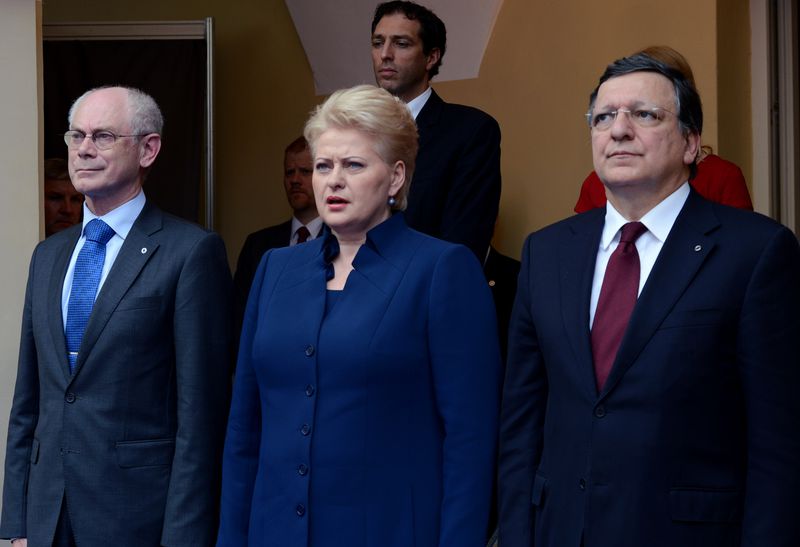 "There are different mentalities and different ideas about political responsibility in the North and the South". This is what Lithuania's President Dalia Grybauskaite said in an interview for the German weekly Der Spiegel in April on the occasion of the first presidency of the Council of the EU of a country from the Baltic trio. Lithuania took the rotating presidency on July 1st, first of the three Baltic small tigers - Lithuania, Latvia and Estonia - which is expected to be different. Why? This is not the first country from the big bang enlargement to the former communist camp in 2004. At the helm of the Council already were Slovenia, the Czech republic, Poland, Hungary. What makes the Baltic presidency different? The fact that those are the only EU member states which relatively recently were part of the Soviet Union, not only of its influence sphere.
"There are different mentalities and different ideas about political responsibility in the North and the South". This is what Lithuania's President Dalia Grybauskaite said in an interview for the German weekly Der Spiegel in April on the occasion of the first presidency of the Council of the EU of a country from the Baltic trio. Lithuania took the rotating presidency on July 1st, first of the three Baltic small tigers - Lithuania, Latvia and Estonia - which is expected to be different. Why? This is not the first country from the big bang enlargement to the former communist camp in 2004. At the helm of the Council already were Slovenia, the Czech republic, Poland, Hungary. What makes the Baltic presidency different? The fact that those are the only EU member states which relatively recently were part of the Soviet Union, not only of its influence sphere.
Being small and tucked in far north among regional and European giants and leaders, the Baltic small tigers rarely attracted attention. Somewhat naturally sounded that Estonia is an economic and technological miracle, that it was the first of the Baltic nations to adopt the euro in 2011. The Latvian desire as of January 1st to become the 18th member of the euro area also does not cause any special emotions, but just eyebrow raising "now?!", because of the problems the Economic and Monetary Union (EMU) has now. And next year, Lithuania, too, is expected to start walking toward the eurozone and probably on January 1st 2015 it will become its 19th member.
More than a membership
There is hardly something better at this particular moment of development of the EU at the helm of the Council to be a member that knows very well why it had joined the Union, it is aware of the price, it knows why it needs the single currency, it feels on its back every day the vulnerability of the incomplete "singleness" of the energy and foreign policy. And last but not least - a country that knows what a crisis is and how to handle it. I am convinced that the Lithuanian Presidency will bring a lot of sobriety in European politics and will remind both old and new member states why the EU was established and how should it look like in order to make sense. My conviction was supported additionally by the huge and very deep analysis by the Notre Europe - Jacques Delors Institute think-tank, divided into three parts - history, economy and energy. These parts are not written by "old Europeans" who stand aside reading big books.
The analyses are written by locals. "The people of the Baltic can and should be proud of their innovative spirit that makes them excellent business and investment partners. Used to hardship and knowing all the cons of peripheral location, the nations are a real boost to the EU in the difficult crisis times", wrote in the foreword to the analysis Jerzy Buzek, former president of the European Parliament, a Pole. He had found the key word that describes the driving power of the region - interconnectedness, both historical and economic. Jerzy Buzek also recalls the "Baltic way" by which the Baltic people manifested their desire for independence.
"In my homeland Poland, the ‘Decade of Solidarity’ was culminating after the first free parliamentary elections. In Czechoslovakia, the ‘Velvet Revolution’ was gaining momentum, to erupt in late autumn following students’ demonstrations. And while the darkest symbol of the division of Europe was collapsing in Berlin, in the Baltic the mobilisation of civil society and independence movement resulted in an amazing human chain in which two million people stood side by side along a 600-kilometre stretch from Tallinn to Riga to Vilnius", Mr Buzek writes.
Notre Europe's analysis is trying to "acquaint" the readers with the history of the three states and says that although we put them in one basket, they are actually not as same as we think. Apart from being different in terms of language - the Lithuanian and Latvian are a group in the Indo-European language family, while the Estonian is part of the Finno-Ugric group - historically the Latvians and Estonians have much more in common with one another than with the Lithuanians. Besides, the Latvians and Estonians are predominantly Lutherans while the Lithuanians are Catholics. Until the 20th century, Estonia and Latvia were often subject of German conquests and through the years they were 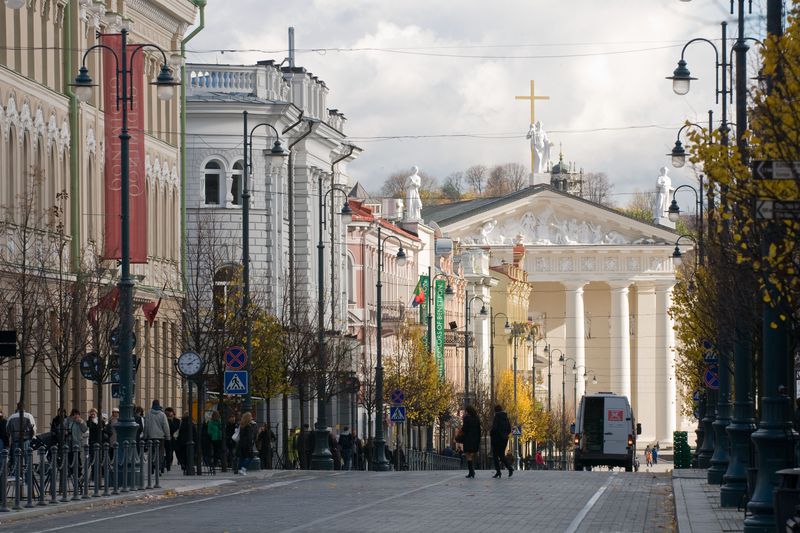 conquered by Danes, Poles, Swedes and finally by Russians. Lithuania, though, was the biggest state in Europe in the 15th century, controlling a large part of today's territories of Belarus and western Ukraine.
conquered by Danes, Poles, Swedes and finally by Russians. Lithuania, though, was the biggest state in Europe in the 15th century, controlling a large part of today's territories of Belarus and western Ukraine.
The entire 20th century, however, is marked by the Soviet domination which leaves a dramatic legacy, as Professor Andres Kasekamp describes it, director of the Estonian Foreign Policy Institute and professor of Baltic politics in the University of Tartu, Estonia. Before becoming part of the USSR, Estonia was more than 90% ethnically Estonian and Latvia - almost 80% in 1945. By the end of the Soviet period, the share of Estonians dropped at 62 per cent and of the Latvians - down to just 52%, which puts in doubt, as Professor Kasekamp puts it, the status of the majorities in their own homeland. The three republics' desire to leave the USSR is undoubted. What was not clear, however, was what path should they embark on. Out of the three options - neutrality, sovereign association with the Russian sphere which, at the time (the Yeltsin period), showed a trend of democratisation, or European integration.
For me it was a surprise to read in Professor Kasekamp's analysis that the third option was the least likely. History, though, was the leading factor for choosing it because in 1939 the Baltic nations pronounced neutrality, but this did not prevented them from the occupation by the Soviet Union and Nazi Germany. "This lesson showed that the Baltic states should better avoid finding themselves isolated and without strong allies again", writes the professor. The devastating experience from almost half a century long Soviet rule quite naturally pushes the Baltic nations westward in which direction they are determined to move as fast as possible and as farthest from Russia and the policies associated with it as possible. A lesson which Bulgaria has still not learned. The third reason is that post-Soviet Russia was sinking into chaos, while Western Europe was offering, at the time, hope for freedom and prosperity.
Moreover, unlike Poland, for the Baltic countries EU membership was not a matter of when, but a matter of if because they started from a very weak position. They were the poorest and least known candidates. Their border with the former Soviet Union still was a "geopolitical red line" and there were fears that Russia could be upset, especially in terms of the issue with the Russian-speaking minority in Estonia and Latvia. Not to mention the fact that politically the Baltic nations were the most vulnerable 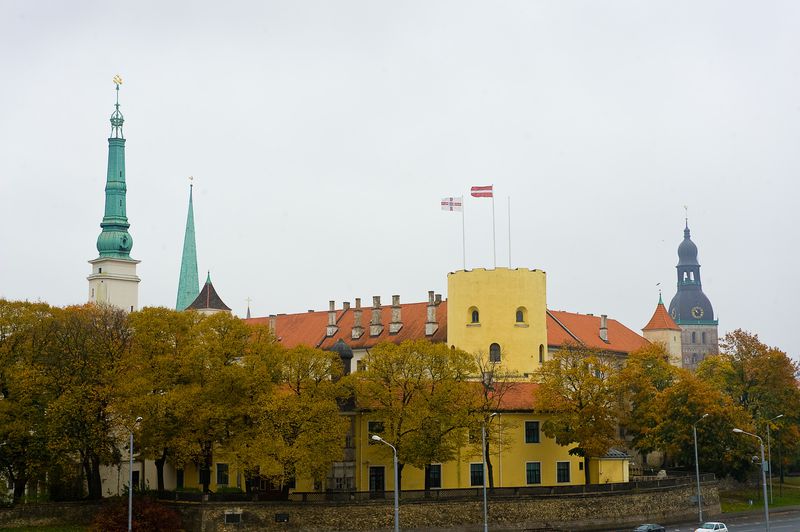 ones. There was a real danger that they could be left behind. That is why they undertake such steps to fulfil the political criteria to avoid that from happening.
ones. There was a real danger that they could be left behind. That is why they undertake such steps to fulfil the political criteria to avoid that from happening.
And they are succeeding in a remarkable way. Not only politically, but economically too. The analyst also points out a very important fact which is in the foundation of the efforts of the three small tigers to break up with their Soviet past. Unlike the countries from the Warsaw Pact who were under communist rule, but maintained their sovereignty, the Baltic states had to start from scratch. They did not have neither an army nor ministry of defence, diplomats, national currency, a central bank, not even border police, customs officers, you name it, that is innate for sovereign states.
Against the backdrop of all this, the professor's claim is really surprising that the EU accession was led by the political elites in the three countries, because there was an obvious division between the visions of the elite and the population. It is indeed surprising that Estonia and Latvia were the most sceptic in terms of EU membership. The Lithuanians were much more enthusiastic and were among the first to hold a referendum for accession in 2003 at which 90% of them supported it. The Estonian and Latvian governments, however, tactically waited with the referendum until votes passed in the other candidate countries.
Politically, the processes were driven by centre-right coalitions which were in power almost throughout the entire period of independence of Estonia and Latvia. The Lithuanian political system is rather different from the Estonian and Latvian ones. According to Professor Kasekamp, the successor of the Lithuanian Communist Party managed successfully to transform itself into a European Social-Democratic party. If you are asking why that transformation was successful quite to the opposite of the Bulgarian case the reason is simple. The LCP played an important role in ensuring Lithuania's independence, while the Estonian and Latvian CPs were dominated by ethnic Russians and for that reason they were perceived as alien bodies.
All these historical and political factors are the basis of the current pro-European policies of the three Baltic states. During the negotiations on the Lisbon Treaty, the three demonstrated serious enthusiasm for deeper integration. That was the reason why the ratification of the treaty passed practically without debates. Moreover, the Baltic countries are among the most passionate opponents of Europe's division into two or more tiers. The fear of such a division drives them to haste with the eurozone accession.
Austerians by soul
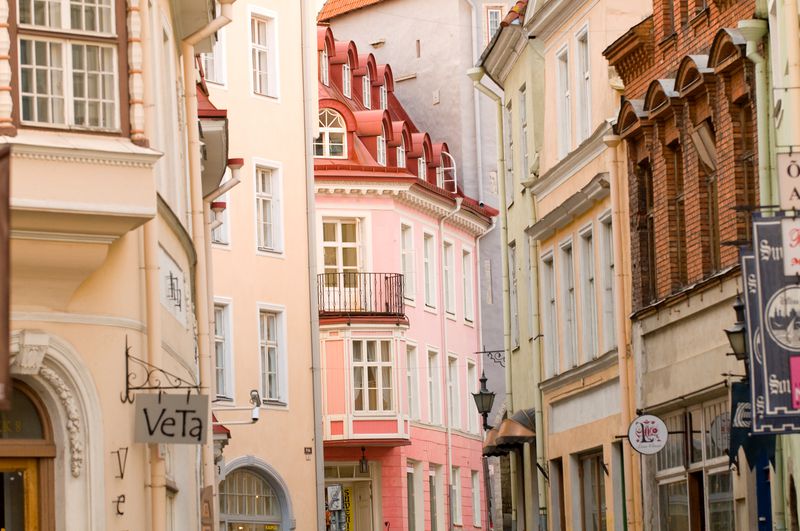 The Baltic countries are currently the only ones in the EU (and not only) with an enviable pace of economic growth. They passed through two quite severe crises which is defining for their attitude toward stability, fiscal and economic policies. All the three have a very rich experience, to some extent different, in handling crises and paying the price for them. It is no accident that Lithuania makes that experiences an essential element of its six-month presidency of the Council. Kristina Maslauskaite (Lithuania), an economic analyst with Notre Europe, and Liva Zorgenfreija (Latvia), also an economist in the think-tank, warn, though, that although the austerity policy had played an important role in the economic recovery of the Baltic countries, it must be recognised that the factors that led to such a recovery are too specific. Besides, it is still early to assess to what extent the real price of austerity could surface, especially in social terms.
The Baltic countries are currently the only ones in the EU (and not only) with an enviable pace of economic growth. They passed through two quite severe crises which is defining for their attitude toward stability, fiscal and economic policies. All the three have a very rich experience, to some extent different, in handling crises and paying the price for them. It is no accident that Lithuania makes that experiences an essential element of its six-month presidency of the Council. Kristina Maslauskaite (Lithuania), an economic analyst with Notre Europe, and Liva Zorgenfreija (Latvia), also an economist in the think-tank, warn, though, that although the austerity policy had played an important role in the economic recovery of the Baltic countries, it must be recognised that the factors that led to such a recovery are too specific. Besides, it is still early to assess to what extent the real price of austerity could surface, especially in social terms.
Nonetheless, in spite of the specifics, the Baltic nations' experience is very telling not simply in economical terms, but political and social terms as well. Before independence in Estonia, for instance, there were only 34, mainly small, private companies and 90% of the exports were for the USSR. You can imagine the scale of restructuring, especially in a situation when the transition starts while there is a process of hyperinflation in the rouble area, amounting to 1000% (a thousand percent) in all the three countries in 1992. The loss of gross domestic product that year was over 20% in Estonia and Lithuania and over 30 percent in Latvia. The three nations pass through the "children's" diseases of transition - almost a complete take over of the financial sector by foreign banks (in their case Scandinavian), a dramatic increase of private indebtedness as a result of low interest rates and a construction bubble.
In the relatively short period of prosperity after independence, the wages outpaced productivity. A disease from which Bulgaria suffers as well, even today. The period of remarkable upsurge after the independence was poured with a cold shower by the recession that rushed in in 2009 in the three states, although to a various extent. A development that was completely expected by the economists, by the way. What was not expected, though, was the scale. Production shrank in one year by 18% in Latvia, 15% in Lithuania and 14% in Estonia.
The recipe for treatment is simple: low levels of public debt; export driven recovery; flexible labour markets. The latter is very important and has to be analysed carefully by the southern economies. Both economic analysts underscore that the labour markets in the Baltic nations are much more flexible than those in the southern periphery in several dimensions. For instance, the strictness of employment protection in Estonia is much lower than in Portugal and Greece. It is not to be ignored a fact that the trade unions are very weak in the three countries and the collective bargaining has the lowest coverage compared to the rest of the EU. Generous is a word that cannot be applied to describe the unemployment compensations in the three countries. They are below EU average and in Portugal, Greece and Ireland, they are above average.
Juncker's conundrum
May be the most important factor for the success of the three Baltic states in less than three years to pass through a second severest recession and again come up in a plus, a huge plus, is public support. In Estonia and Latvia the austerian governments were re-elected and "seem to have solved J. C. Juncker’s conundrum of how to adopt politically unpopular reforms and get re-elected afterwards". Although the austerian government in Lithuania is losing in the latest polls, it will be remembered as the first after the independence to make a full term. The analysts from Notre Europe note another key factor for the success of the three countries - there is still no full round generation change which means that 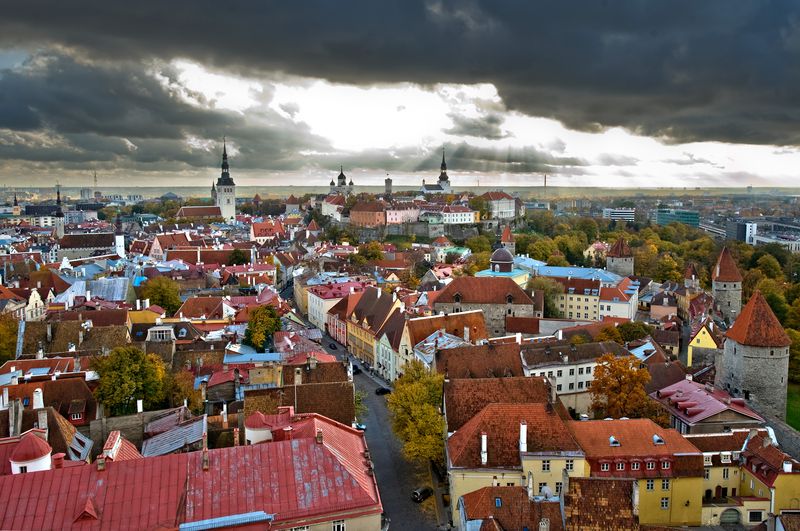 national memory about the troubles in the 1990s facilitated the taking of the bitter pill of austerity in the context of deep recession.
national memory about the troubles in the 1990s facilitated the taking of the bitter pill of austerity in the context of deep recession.
Another social factor is that unlike the "old democracies", because of their heavy historic legacy, the civil societies in the Baltic countries are quite immature and in general collective actions are a rarity. As a result, instead of taking part in political actions, a large part of the Baltic people preferred to "vote with their feet" by emigrating. Last but not least is the fact that there was a very deep national consensus among the political parties and among the citizens about the need of belt-tightening and economic restructuring. That consensus was very well explained by the Latvian minister of finance earlier this year at a hearing in the economic committee of the European Parliament. Andris Vilks said in February that the most important thing is to maintain stable communication with the social partners and the citizens. Moreover, use your heads and do not listen to Nobel laureates, he added.
Energy Soviet occupation
The history of the Baltic states and their huge aspiration for the Europe's core and also for deepening of the European integration, show unequivocally their desire to keep themselves as far as possible from Russian influence. Alas, in the energy area the EU betrays them. This is precisely why the three countries, to a various extent, are among the driving forces for a common energy policy. They are also pioneers in involving the European Commission in their negotiations with Russia. Quite and interesting phenomenon, as a matter of fact. Dr Agnia Grigas, a researcher of energy markets in Eastern Europe and Russia with Notre Europe, points out that the three Baltic states, just like Bulgaria, Romania, Slovakia and Finland, are almost entirely dependent on the imports of Russian natural gas. They are much more vulnerable compared to most of the member states because their imports depends on "a single and potentially hostile source".
The lack of interconnectedness with the rest of the Union's members dooms them to a continuous energy diktat by Moscow. But that dependence also pushes them to developing shale gas reserves which, however, are not significant compared to their needs. For instance, it is suggested that Lithuania owns the biggest shale gas reserves of 10 billion cubic metres. Compared to its consumption, though, these quantities will be enough for only three years. Just like Bulgaria, the three Baltic nations are subjected to huge pressure to built with Russian participation nuclear power stations. For ten years Lithuania has been trying to build a regional plant in Visaginas with the assistance of Poland, Estonia and Latvia.
But the project is dragging its feet due to bureaucratic chaos and also to disagreements among the political parties, Russia's meddling, the lack of interest by commercial investors and also because of scepticism in Warsaw, Tallinn and Riga. Familiar, right? The picture is further complicated by the fact 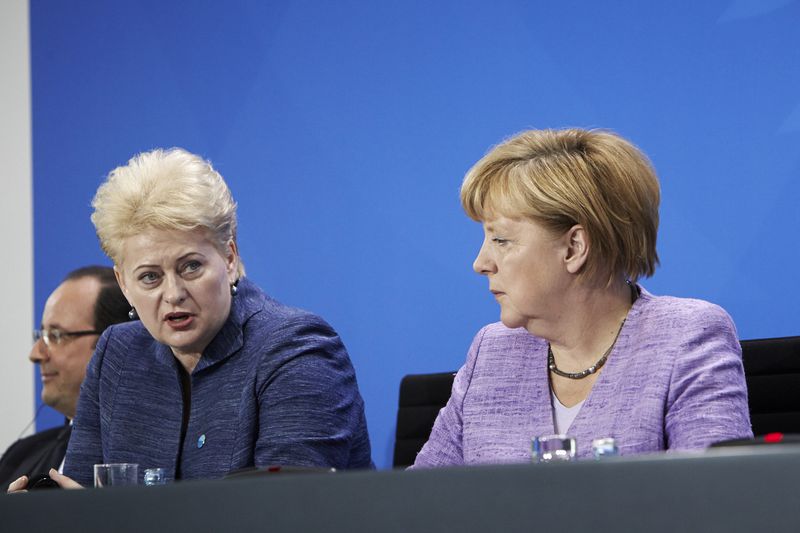 that at the national referendum in 2012 only 34% of voters supported the construction of a new plant while 63 per cent voted against.
that at the national referendum in 2012 only 34% of voters supported the construction of a new plant while 63 per cent voted against.
All this should remind the other member states why are we in the EU. If the older members have forgotten or if they are too busy with their problems in the euro area they should listen to Dalia Grybauskaite who answered the persistent questions by Der Spiegel why cannot Lithuania wait with the euro area accession because it will have to bail troubled countries out, saying: "We are not afraid of our responsibility. We receive 25 percent of our national budget from the European Union. We understand the value of solidarity". Do Greece and Portugal understand it? Does Bulgaria? Do they understand why Lithuania's President Dalia Grybauskaite travels with low-cost air companies instead of a government air plane?
 Federica Mogherini | © Council of the EU
Federica Mogherini | © Council of the EU | © Council of the EU
| © Council of the EU Luis De Guindos | © Council of the EU
Luis De Guindos | © Council of the EU